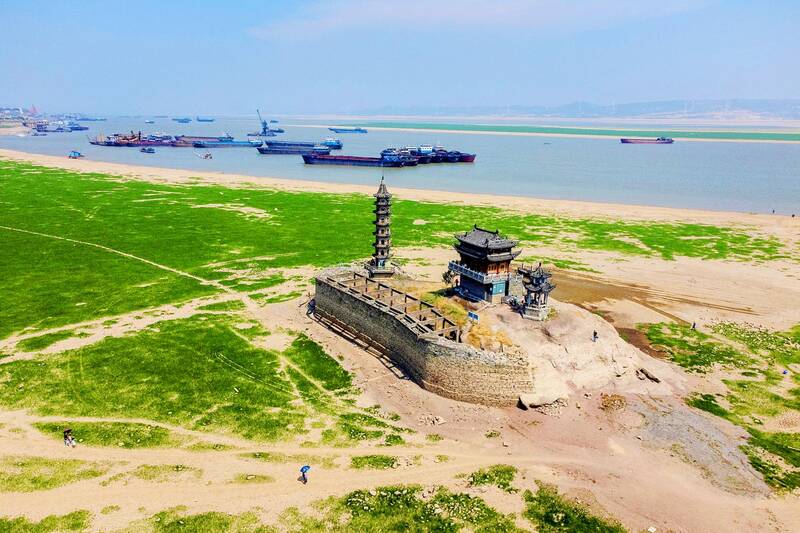A crippling drought exacerbated by a record heat wave has spread across half of China and reached the normally frigid Tibetan Plateau, according to official data released ahead of more searing temperatures yesterday.
The world’s second-largest economy has experienced more than 70 days of heat waves, flash floods and droughts — phenomena that scientists say are becoming more frequent and intense due to climate change.
Southern China has recorded its longest continuous period of high temperatures since records began more than 60 years ago, the Chinese Ministry of Agriculture said this week.

Photo: Reuters
Experts have said the intensity, scope and duration of the heat wave could make it one of the worst recorded in global history.
A chart from the National Climate Center on Wednesday showed that swathes of southern China — including the Tibetan Plateau — were experiencing “severe” to “extraordinary” drought conditions.
The worst-affected area — the Yangtze River basin, stretching from coastal Shanghai to Sichuan Province in China’s southwest — is home to more than 370 million people and contains several manufacturing hubs, including the megacity of Chongqing.
The China Meteorological Administration predicted continued high temperatures of up to 40oC in Chongqing and the provinces of Sichuan and Zhejiang yesterday.
However, some regions gained relief from the heat wave. Parts of southwestern Sichuan were battered by heavy rains overnight, causing the evacuation of almost 30,000 people, state broadcaster CCTV reported.
And in the southeast, Typhoon Ma-on made landfall in coastal Guangdong Province and Hong Kong yesterday morning.
“High temperatures have basically been alleviated in the regions of south China, Jiangxi and Anhui,” the meteorological agency said. “But high temperatures will continue for the next three days in regions including the Sichuan basin and provinces surrounding Shanghai.”
The Chinese State Council on Wednesday announced a 10 billion yuan (US$1.46 billion) subsidy to support rice farmers experiencing drought conditions, which authorities have warned pose a “severe threat” to this year’s autumn harvest.
China produces more than 95 percent of the rice, wheat and maize it consumes, but a reduced harvest could mean increased demand for imports in the world’s most-populous country — putting further pressure on global supplies already strained by the conflict in Ukraine.
Wednesday’s China Central Television evening news broadcast showed trucks supplying villagers who lacked drinking and agricultural water in rural Sichuan and Chongqing.

The US government has signed defense cooperation agreements with Japan and the Philippines to boost the deterrence capabilities of countries in the first island chain, a report by the National Security Bureau (NSB) showed. The main countries on the first island chain include the two nations and Taiwan. The bureau is to present the report at a meeting of the legislature’s Foreign Affairs and National Defense Committee tomorrow. The US military has deployed Typhon missile systems to Japan’s Yamaguchi Prefecture and Zambales province in the Philippines during their joint military exercises. It has also installed NMESIS anti-ship systems in Japan’s Okinawa

‘WIN-WIN’: The Philippines, and central and eastern European countries are important potential drone cooperation partners, Minister of Foreign Affairs Lin Chia-lung said Minister of Foreign Affairs Lin Chia-lung (林佳龍) in an interview published yesterday confirmed that there are joint ventures between Taiwan and Poland in the drone industry. Lin made the remark in an exclusive interview with the Chinese-language Liberty Times (the Taipei Times’ sister paper). The government-backed Taiwan Excellence Drone International Business Opportunities Alliance and the Polish Chamber of Unmanned Systems on Wednesday last week signed a memorandum of understanding in Poland to develop a “non-China” supply chain for drones and work together on key technologies. Asked if Taiwan prioritized Poland among central and eastern European countries in drone collaboration, Lin

NO CONFIDENCE MOTION? The premier said that being toppled by the legislature for defending the Constitution would be a democratic badge of honor for him Premier Cho Jung-tai (卓榮泰) yesterday announced that the Cabinet would not countersign the amendments to the local revenue-sharing law passed by the Legislative Yuan last month. Cho said the decision not to countersign the amendments to the Act Governing the Allocation of Government Revenues and Expenditures (財政收支劃分法) was made in accordance with the Constitution. “The decision aims to safeguard our Constitution,” he said. The Constitution stipulates the president shall, in accordance with law, promulgate laws and issue mandates with the countersignature of the head of the Executive Yuan, or with the countersignatures of both the head of the Executive Yuan and ministers or

BACK TO WORK? Prosecutors said they are considering filing an appeal, while the Hsinchu City Government said it has applied for Ann Kao’s reinstatement as mayor The High Court yesterday found suspended Hsinchu mayor Ann Kao (高虹安) not guilty of embezzling assistant fees, reducing her sentence to six months in prison commutable to a fine from seven years and four months. The verdict acquitted Kao of the corruption charge, but found her guilty of causing a public official to commit document forgery. The High Prosecutors’ Office said it is reviewing the ruling and considering whether to file an appeal. The Taipei District Court in July last year sentenced Kao to seven years and four months in prison, along with a four-year deprivation of civil rights, for contravening the Anti-Corruption